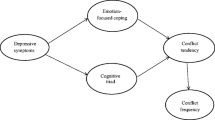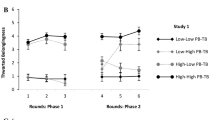Abstract
Self-complexity refers to the number and interrelatedness of a person's conceptions of himself or herself. In both a naturalistic survey and a laboratory study, we applied self-complexity theory to test a marker of cognitive vulnerability to interpersonal stress, specifically the aspect impact quotient (AIQ) of the interpersonal self. A high interpersonal AIQ reflects an interpersonal self with a large number of traits that are dispersed among other self-aspects. In Study 1, we found that subjects with high compared with low interpersonal AIQ became more dysphoric after the experience of real-life interpersonal (friend) stressors, and that this effect was unique to interpersonal AIQ, In Study 2, we hypothesized that affective reactions to interpersonal acceptance or rejection in the laboratory would be more extreme for individuals with high compared with low interpersonal AIQ. Analysis of positive affect revealed the hypothesized effect for AIQ × Outcome, and this effect was unique to interpersonal AIQ. However, subjects' negative affect was unrelated to their interpersonal AIQ. Overall, the results of these two studies suggest that the relative structure of each individual's interpersonal self influences his or her affective reactions to interpersonal events, and that self-complexity theory, applied to a specific self-aspect, can contribute to an understanding of stress vulnerability.
Similar content being viewed by others
REFERENCES
Beck, A. T. (1987). Cognitive models of depression. Journal of Cognitive Psychotherapy, 1, 5–37.
Brown, G., & Harris, T. (1989). Depression. In G. Brown & T. Harris (Eds.), Life events and illness (pp. 49–93). New York: Guilford Press.
Cohen, J., & Cohen, P. (1983). Applied multiple regression/correlation analysis for the behavioral sciences (2nd ed.). Hillsdale, NJ: Erlbaum.
Cohen, L. H. (1988). Measurement of life events. In: L. H. Cohen (Ed.), Life events and psychological functioning: Theoretical and methodological issues (pp. 11–30). Newbury Park, CA: Sage.
Cohen, L. H., Towbes, L., & Flocco, R. (1988). Effects of induced mood on self-reported life events and perceived and received social support. Journal of Personality and Social Psychology, 55, 669–674.
Coyne, J., & Whiffen, V. (1995). Issues in personality as diathesis for depression: The case of sociotropy-dependency and autonomy-self-criticism. Psychological Bulletin, 118, 358–378.
Dixon, T., & Baumeister, R. (1991). Escaping the self: The moderating effect of self-complexity. Personality and Social Psychology Bulletin, 17, 363–368.
Epstein, S., & O'Brien, E. (1985). The person-situation debate in historical and current perspective. Psychological Bulletin, 98, 513–537.
Hammen, C., Marks, T., Mayol, A., & DeMayo, R. (1985). Depressive self-schemas, life stress, and vulnerability to depression. Journal of Abnormal Psychology, 94, 308–319.
Hilsman, R., & Garber, J. (1995). A test of the cognitive diathesis-stress model of depression in children: Academic stressors, attributional style, perceived competence, and control. Journal of Personality and Social Psychology, 69, 370–380.
Judd, C., & McClelland, G. (1989). Data analysis. San Diego: Harcourt Brace Jovanovich.
Linville, P. (1985). Self-complexity and affective extremity: Don't put all of your eggs in one cognitive basket. Social Cognition, 3, 94–120.
Linville, P. (1987). Self-complexity as a cognitive buffer against stress-related illness and depression. Journal of Personality and Social Psychology, 52, 663–676.
Monroe, S., & Simons, A. (1991). Diathesis-stress theories in the context of life stress research: Implications for the depressive disorders. Psychological Bulletin, 110, 406–425.
Nadler, A., Jazwinski, C., Lau, S., & Miller, A. (1980). The cold glow of success: Responses to social rejection as affected by attitude similarity between the rejected and chosen individuals. European Journal of Social Psychology, 10, 279–289.
Neeman, J., & Harter, S. (1986). Manual for the Self-Perception Profile for College Students. Unpublished manual, Department of Psychology, University of Denver.
Niedenthal, P., Setterlund, M., & Wherry, M. (1992). Possible self-complexity and affective reactions to goal-relevant evaluation. Journal of Personality and Social Psychology, 63, 5–16.
Park, C., Cohen, L. H., & Herb, L. (1990). Intrinsic religiousness and religious coping as life stress moderators for Catholics versus Protestants. Journal of Personality and Social Psychology, 59, 562–574.
Radloff, L. (1977). The CES-D Scale: A self-report depression scale for research in the general population. Applied Psychological Measurement, 1, 385–401.
Reich, J., & Zautra, A. (1988). Direct and stress-moderating effects of positive life expereinces. In L. H. Cohen (Ed.), Life events and psychological functioning: Theoretical and methodological issues (pp. 149–180). Newbury Park, CA: Sage.
Robins, C., Ladd, J., Welkowitz, J., Blaney, P., Diaz, R., & Kutcher, G. (1994). The Personal Style Inventory: Preliminary validation studies of new measures of sociotropy and autonomy. Journal of Psychopathology and Behavioral Assessment, 16, 277–300.
Sandler, I., & Lakey, B. (1982). Locus of control as a stress moderator: The role of control perceptions and social support. American Journal of Community Psychology, 10, 65–73.
Simons, A., Angell, K., Monroe, S., & Thase, M. (1993). Cognition and life stress in depression: Cognitive factors and the definition, rating, and generation of negative life events. Journal of Abnormal Psychology, 102, 584–591.
Smith, H., & Cohen, L. H. (1993). Self-complexity and reactions to a relationship breakup. Journal of Social and Clinical Psychology, 12, 367–384.
Swindle, R., Heller, K., & Lakey, B. (1988). A conceptual reorientation to the study of personality and stressful life events. In L. H. Cohen (Ed.), Life events and psychological functioning: Theoretical and methodological issues (pp. 237–268). Newbury Park, CA: Sage.
Towbes, L., & Cohen, L. H. (1996). Chronic stress in the lives of college students: Scale development and prospective prediction of distress. Journal of Youth and Adolescence, 25, 199–217.
Wagner, B., & Compas, B. (1990). Gender, instrumentality, and expressivity: Moderators of the relation between stress and psychological symptoms during adolescence. American Journal of Community Psychology, 18, 383–406.
Zuckerman, M., & Lubin, B. (1985). Manual for the Multiple Affect Adjective Check List—Revised. San Diego, CA: Educational and Industrial Testing Service.
Author information
Authors and Affiliations
Rights and permissions
About this article
Cite this article
Cohen, L.H., Pane, N. & Smith, H.S. Complexity of the Interpersonal Self and Affective Reactions to Interpersonal Stressors in Life and in the Laboratory. Cognitive Therapy and Research 21, 387–407 (1997). https://doi.org/10.1023/A:1021951425807
Issue Date:
DOI: https://doi.org/10.1023/A:1021951425807




